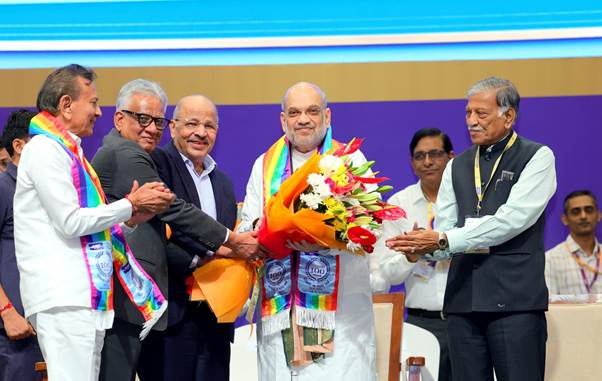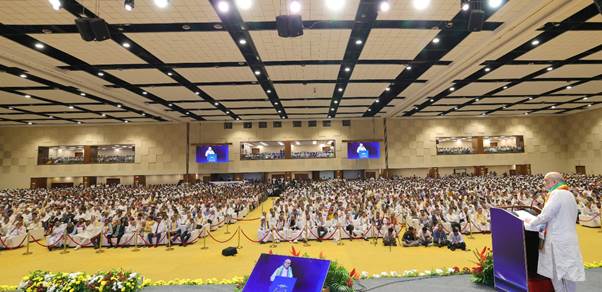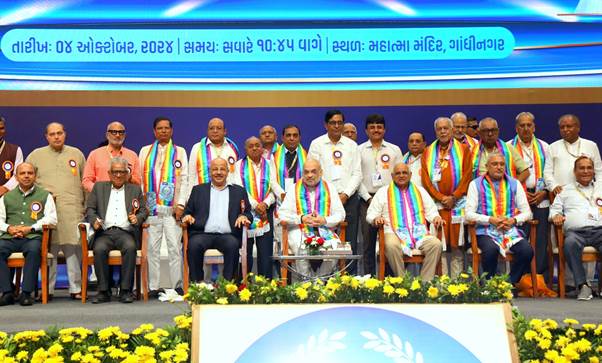Ministry of Cooperation
Union Home Minister and Minister of Cooperation, Shri Amit Shah addresses the Centennial celebration of the Ahmedabad District Cooperative (ADC) Bank as the chief guest
Under the leadership of Prime Minister Shri Narendra Modi, the Ministry of Cooperation is taking the cooperative societies forward by removing the obstacles in their functioning
ADC Bank's zero NPA is proof of its transparency
ADC Bank has truly lived up to the mantra of ‘Big Bank for Small People’
Ahmedabad District Cooperative Bank is the highest profit-making district cooperative bank in India
All co-operative institutions should open their bank accounts in co-operative banks
Co-operation is the economic model in which everyone's interests are taken care of
Bringing together many individuals with limited capital to create a larger pool of resources, providing them a platform to work, ensuring their prosperity, and arranging for a dignified life – that is Cooperation
प्रविष्टि तिथि:
04 OCT 2024 6:41PM by PIB Delhi
Union Home Minister and Minister of Cooperation, Shri Amit Shah today addressed the Centennial celebration (Swarnim Shatabdi Mahotsav) of the Ahmedabad District Cooperative (ADC) Bank as the chief guest. On this occasion, Gujarat Chief Minister Shri Bhupendra Patel, Union Cooperation Secretary Dr. Ashish Kumar Bhutani, and several other dignitaries were present.

In his address, Shri Amit Shah said that when an institution, despite many ups and downs, completes 100 years with honesty, it is not just a matter of pride for the institution but for the entire society. He emphasized that this becomes even more significant when the institution is a cooperative one, whose aim is to work not only for its interest, but for collective progress by uniting smaller sections of society.
The Union Minister of Cooperation noted that the 100-year journey of Ahmedabad District Cooperative Bank, established in 1925, is a testament to the prosperity of farmers in Ahmedabad district. He said that the bank, which started as a small institution in Daskroi, has grown today to become one of the strongest district cooperative banks in the country, with a profit of Rs. 100 crore. Shri Shah remarked that with nearly zero Non-Performing Assets (NPA), a profit of Rs. 100 crore, and deposits of around Rs. 6,500 crore, perhaps no one could have imagined at its inception that this small seed would grow into such a big tree, benefiting many.
Shri Amit Shah highlighted that ADC Bank has illuminated the lives of many societies, farmers, and livestock owners over the past hundred years. He noted that while various forms of agricultural assistance are easily available today, there was no such support system for farmers at the time of inception of ADC bank. At that time, farmers had no choice but to mortgage their land to moneylenders for loans. If a drought occurred and farmers were unable to repay their debts, they often lost their land and became farm laborers. Shri Shah explained that it was Mahatma Gandhi who suggested to Sardar Vallabhbhai Patel the need to start the cooperative movement in Gujarat, following which many pioneers like Tribhuvandas Patel and Sardar Patel launched the cooperative movement. He expressed confidence that the cooperative sector, with its century-old history in India, will continue to contribute significantly in the coming century.
The Union Home Minister and Minister of Cooperation said that while many successful economic models exist around the world in small countries with populations of 20-30 million, these models are not suitable for a large country like India with 1.3 billion people. He stressed that economic development alone is not sufficient for progress in a country like India. A successful economic model must also take into account the well-being, dignity, and happiness of its 1.3 billion citizens, something that can be found in the cooperative movement.

Shri Amit Shah stated that when the cooperative movement began in India 120 years ago, it had immense potential, which is even more relevant today. He cited the example of Gujarat's Amul, which has provided employment to 3.5 million women, none of whom invested more than 100 rupees, yet today, Amul’s turnover is Rs. 60,000 crore. He also shared an anecdote about a woman from Banaskantha who was delighted to receive a Rs. 8 million cheque for her dairy-related work, demonstrating the empowerment brought about by cooperatives.
As the former chairman of Ahmedabad District Cooperative Bank, Shri Shah said that during his visits to villages, people referred to ADC as the “big bank for small people.” He explained that ADC has truly lived up to this motto by providing a platform for people with limited capital to pool resources and prosper. Shri Shah said that Cooperation is bringing together many individuals with limited capital to create a larger pool of resources, providing them a platform to work, ensuring their prosperity, and arranging for a dignified life.
Shri Amit Shah also noted that for the past 70 years, there had been a demand to establish a Ministry of Cooperation at national level. Despite this, cooperative activities related to the vast cooperative movement were being handled by a Joint Secretary level officer in the Ministry of Agriculture. However, three years ago, Prime Minister Shri Narendra Modi created an independent Ministry of Cooperation, which gave new life to the cooperative movement. Shri Shah said that many important decisions taken by Prime Minister Modi in the past few years will be recognized as pathbreaking 25-30 years from now, and establishment of the Ministry of Cooperation will be one among them.
Shri Shah praised Ahmedabad District Cooperative Bank, which had once faced numerous challenges but now records the highest profits of any district cooperative bank in India. He also credited service cooperative societies for their significant contribution to the bank's success. He noted that administrative obstacles once hindered the operations of these societies, but in the past three years, Prime Minister Modi has removed these obstacles. A system has been created where these societies have access to warehouses, are computerized, receive interest-free loans, and can operate gas agencies, petrol pumps, and water committees. Shri Shah mentioned that model bye-laws were created for such societies, and they have been adopted by all state governments. He added that today, all service cooperative societies across the country are operating under the same set of rules and accounting systems. He said that in the coming days, service cooperative societies will become vibrant units at the rural level. Community service centres are also being opened in these societies. Service cooperative societies have become a place where people can access around 300 schemes from both the central and state governments, and it has strengthened the cooperative movement.
Union Minister of Cooperation Shri Amit Shah said that efforts should be made to successfully implement the concept of 'Cooperation among cooperatives' across the country, including Gujarat. He emphasized that all cooperative institutions should have their bank accounts in cooperative banks. This model has been successful in Banaskantha and Panchmahal, and now it needs to be implemented across Gujarat. Shri Shah mentioned that in the last six months, due to the cooperative movement, deposits of Rs. 6,000 crore have been made, 2.4 million bank accounts have been opened, and 8 million credit cards have been issued. He added that today, cooperative banks in Gujarat have a surplus. Earlier, the concern was about securing loans, but now the focus is on lending, as deposits have increased.
The Union Minister of Cooperation said that the Ahmedabad District Cooperative Bank has done commendable work for the development of Gandhinagar and Ahmedabad. He mentioned that during today's event, a book commemorating the centenary celebration and a coffee table book were released, and assistance was provided to some differently-abled citizens. However, these noble efforts should not stop. The Ahmedabad District Cooperative Bank, along with all Agricultural Produce Market Committees (APMC) and service cooperative societies, should continue such initiatives.
Shri Amit Shah said that it is the responsibility of the Ahmedabad District Cooperative Bank to unite all cooperative institutions across the district to address issues related to health, education, and nutrition, and to create an action plan to implement these in every village. He mentioned that the Ahmedabad District Cooperative Bank has been computerized, and several accounting software developed by the bank have been accepted by the Government of India through NABARD, with plans to provide them to all banks in the country. He added that the Ahmedabad District Cooperative Bank has consistently upheld both transparency and accountability. While the Reserve Bank of India (RBI) allows up to 5% NPA, this bank's NPA is nearly zero. Having almost zero NPA is a certificate of the bank’s transparency and efficient operations.

Lastly, Shri Amit Shah paid tribute to freedom fighter Shyamji Krishna Varma on his birth anniversary, honouring him as a great patriot and scholar of Sanskrit who raised his voice for India's independence abroad.
*****
RK/VV/PR/PS
(रिलीज़ आईडी: 2062123)
आगंतुक पटल : 1382